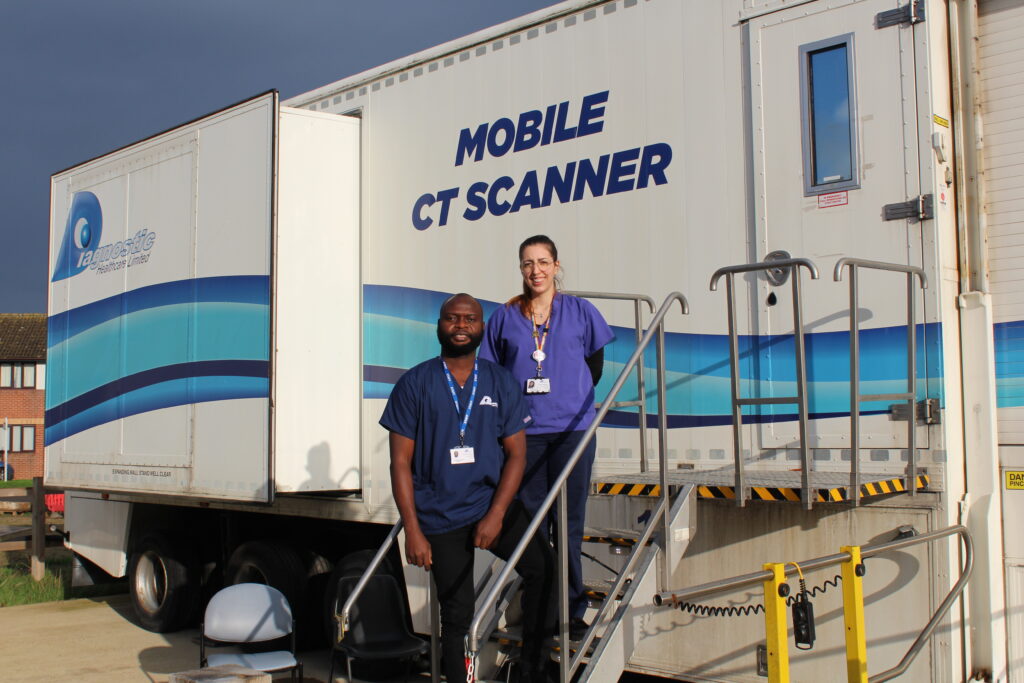
Lung cancer is frequently diagnosed later than other cancers because often there are no signs or symptoms at an early stage. The Lung Cancer Screening Programme (formerly called Targeted Lung Health Check Programme) is a NHS programme which is being rolled out across England and will become a national screening programme in 2029/30. The programme is designed to identify signs of cancer at an early stage when it is much more treatable – ultimately saving lives.
In Norfolk and Waveney, the programme started in 2022 in Great Yarmouth & Gorleston as a pilot and was extended to Lowestoft in 2023. In the summer of 2025 a new programme started which will gradually roll Lung Cancer Screening out to the rest of Norfolk and Waveney.
The Lung Cancer Screening programme is being offered to people between the ages of 55 and 74 who are current or former smokers and therefore at greater risk of lung cancer. It is designed to find out how well someone’s lungs are working and to identify problems early. Most of the time no issue is found, but if cancer or an issue with a participant’s breathing or lungs is found early, treatment could be simpler and more successful.
Individuals who are eligible for Lung Cancer Screening will be contacted by the NHS or our partner organisation TIC Mobile initially for a lung health check. The invitation will be based on your smoking history in your GP record so if you think this might be out of date, let your GP know so they can update your record.
If you would like more information about the local roll out and when you might receive an invite, please go to the East of England Lung Cancer Screening website: https://eoelungcancerscreening.nhs.uk/.

What happens during the check?
There are two main stages to a Lung Cancer Screening. The first is an initial assessment with a health professional and the second, if necessary, is a simple scan of the lungs.
The initial assessment normally takes place over the phone and/or a meeting with a health professional. During the initial Lung Health Check, you will be asked some questions about your smoking history, your overall lung health, lifestyle and family and medical history. An assessment will be made at this appointment of your risk of Lung Cancer based on your answers.
There are three possible results from your lung health check:
No problems found – the health professional may find nothing further to investigate, and you will be discharged from the Lung Cancer Screening programme. The team will write to your GP to tell them this. You may be re-invited in the future if something changes that might change your risk of Lung Cancer.
Referral to your GP – if problems with your breathing or lung health are found, you may be referred to your GP. The Lung Cancer Screening team will write to your GP so they know about the outcome.
Offered a scan of your lungs – If you are assessed to be at higher risk of lung cancer now or in the future you will be offered a scan of your lungs (a Low Dose CT scan). The specialist nurse will help you to choose whether the test is right for you. We will write to your GP so they know about the appointment.
Lung scan
The lung cancer scan uses a low-dose CT scanner to take a detailed picture of your lungs, to check for the early signs of lung cancer.
The appointment will last approximately 15 – 20 minutes and you’ll have a chance to ask the team at the scanner any questions. The scan is completely painless and you will only be on the scanner for a few minutes.
If your scan results come back with signs of anything of concern, you’ll be contacted with further information and referred for further tests and treatment if needed.
The lung scan will take place at the James Paget Hospital for Great Yarmouth/Gorleston/Lowestoft and on a mobile scanner for the rest of Norfolk & Waveney.
Frequently Asked Questions
Booking your check
Individuals who are eligible for Lung Cancer Screening you will be contacted by the NHS or our partner organisation TIC Mobile initially for a lung health check. The invitation will be based on your smoking history in your GP record so if you think this might be out of date, let your GP know so they can update your record.
If you have been invited for a check and need to contact the team, please use the contact details in your invite or go to the East of England Lung Cancer Screening webpages for the most up to date contact details for your area: https://eoelungcancerscreening.nhs.uk/.
Support to stop smoking
Smokefree Norfolk provides stop smoking information and support for people living in Norfolk.
Telephone: 0800 0854 113 (Mon-Fri)
Email: smokefree.norfolk@nhs.net
Website: Home | Smokefree Norfolk
Sign up online: Get Started | Smokefree Norfolk
Feel Good Suffolk is a new way to support people in Suffolk to improve their health and wellbeing. It is a new service offering Stop smoking services to residents in the Lowestoft area.
To find out more please visit their website: www.feelgoodsuffolk.co.uk
To access support follow this link to the self-referral form: Find Support – Feel Good Suffolk
Resources
Download our Great Yarmouth patient leaflet in English, Ukrainian and Portuguese.
Download our Lowestoft leaflet in English.
Please email nwicb.communications@nhs.net if you require these resources in another language or alternative format.
